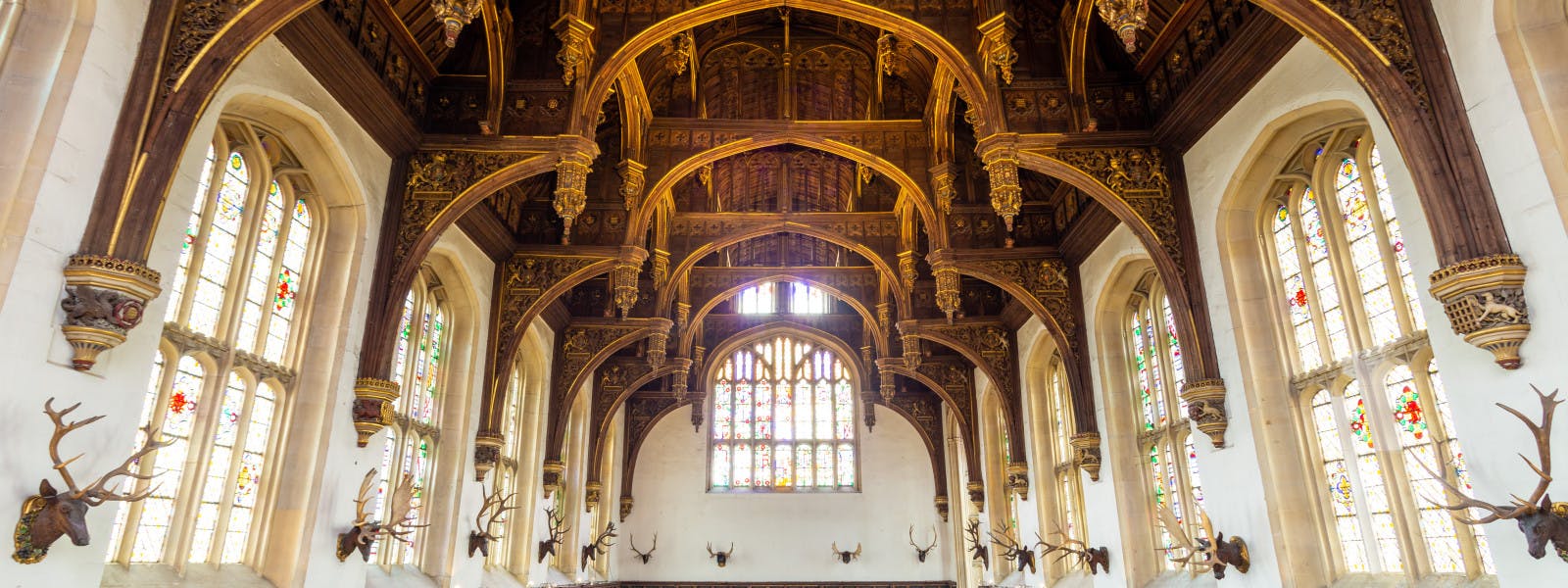
Discover the magnificent heart of the Tudor palace
Skip the event ticket details and go to event summary.
When
Open In line with palace opening hoursTicketing information
Included in palace admission (Members go free)
Buy Hampton Court Palace ticketsThe Great Hall sits at the very heart of the Tudor palace at Hampton Court, towering over the surrounding buildings. It was designed to impress and to proclaim Henry VIII’s power and magnificence.
Even today the size and grandeur of the Great Hall will take your breath away.
Highlights of the Great Hall
Anne Boleyn’s coat-of-arms and initials
By the time that Henry VIII's carpenters began working on the huge timber roof of the Great Hall in 1533, the King had divorced his first wife Katherine of Aragon and was married to his second, Anne Boleyn.
To celebrate Henry and Anne's marriage, the carpenters added Anne's coat-of-arms to the roof and carved the entwined letters H and A on the wooden screen at the end of the Great Hall. These poignant reminders of Anne's time as Queen can still be seen today.
Also featured in the roof is Anne's falcon badge, and the initials AR for Anna Regina — see if you can spot them from the ground floor.
The hammerbeam roof
As you look up at the roof consider the great skill of the craftsmen who made it.
Henry VIII chose the nostalgic hammerbeam style to evoke the great halls of his medieval predecessors. Henry was attracted by tales of their chivalric deeds and modelled himself and his palace on them.
Look out for the 'Eavesdroppers' – the carved and painted heads that decorate the roof of the Great Hall.
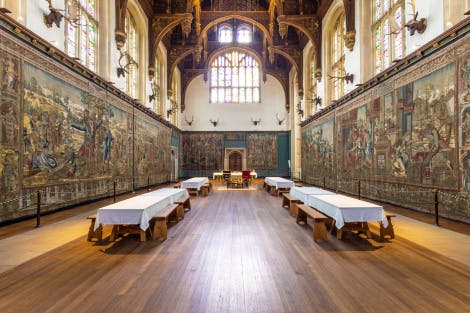
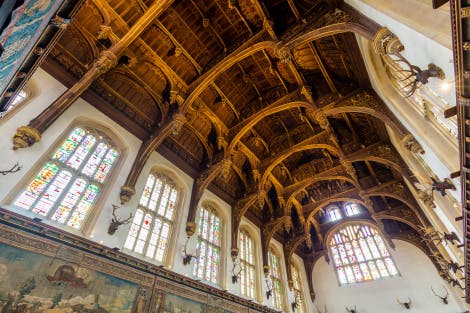
The 'Abraham' tapestries
On the walls of the Great Hall hang a series of tapestries showing scenes from the life of the patriarch Abraham from the Book of Genesis.
These tapestries were probably commissioned by Henry VIII and were certainly first hung in the Great Hall in 1546. They were woven in Brussels from wool, silk, and gold and silver thread.
When the Royal Collection was valued after the execution of Charles I in 1649 the Abraham tapestries were priced at £8,260. This was a phenomenal amount of money and made them the most valuable items in the collection.
Re-hanging the tapestries
Find out how we care for these 500-year-old tapestries as our Conservation team re-hang them in this short film.
This content is hosted on YouTube
This content may be using cookies and other technologies for which we need your consent before loading. To view the content, you need to enable cookies for "Targeting Cookies & Other Technologies".
Manage Cookies
Conserving Henry VIII's 'Abraham' Tapestries
Introducing a major new conservation project at Hampton Court Palace
Textile Treatment Conservator Alice Young introduces a new project to keep the 'Abraham' tapestries looking their best for future generations.
Great Hall history
Remodelling the original palace
Masons and bricklayers began work on this Great Hall in 1532. They replaced a smaller hall that had been built between 1495-1514 and had later been remodelled by Henry VIII's chief minister Thomas Wolsey.
Wolsey had died in disgrace in 1530 having failed to secure the annulment of Henry VIII's marriage to Katherine of Aragon. By this time, Henry had taken over Wolsey's palace at Hampton Court.
Dining and entertaining at the Tudor Court
Great halls were places for eating and for entertaining. On a day-to-day basis, this Great Hall acted as a large refectory for the lower-ranking members of the royal household and servants.
Meals cooked in the nearby great kitchens were served here twice a day. Sittings for dinner started at 10 o'clock in the morning and for supper at 4 o'clock in the afternoon.


Performances and restoration work
A royal theatre
On special occasions the Great Hall was used for plays, dances, and masques. James I's court spent Christmas and New Year 1603-4 at Hampton Court to escape an outbreak of plague in London.
During the festive celebrations William Shakespeare and his company of players performed A Midsummer Night’s Dream in the Great Hall.
By the early 1700s the Great Hall had stopped being used for dining and instead a permanent theatre was built into the space. It included a stage with a proscenium arch, and tiers of raked seating for the audience.
Restorations
The theatre was removed in 1800 by the architect James Wyatt who attempted to restore the Great Hall to its Tudor glory. A second restoration was undertaken in the 1840s by Edward Jesse.
It was during Jesse's works that the stained-glass windows were added. The colourful glass displays the genealogy of Henry VIII, his six wives, and his chief minister Thomas Wolsey.
Explore what's on

- Things to see
Henry VIII's Kitchens
Transport yourself back to the heyday of Tudor feasting and entertainment in Henry VIII's Kitchens at Hampton Court Palace.
-
Open
- In line with palace opening hours
- Hampton Court Palace
- Included in palace admission (Members go free)

- Things to see
Haunted Gallery and Processional Route
Walk Henry VIII’s route from his private apartments to the Chapel and see the infamous Haunted Gallery in the State Apartments.
- Open
- In line with palace opening hours
- Hampton Court Palace
- Included in palace admission (Members go free)

- Things to see
Henry's Crown
Marvel at the sparkling re-creation of Henry VIII's Crown, on display in the Tudor apartments at Hampton Court Palace.
-
Wednesday to Saturday
- In line with palace opening hours
- Hampton Court Palace
- Included in palace admission (Members go free)
Browse more history and stories
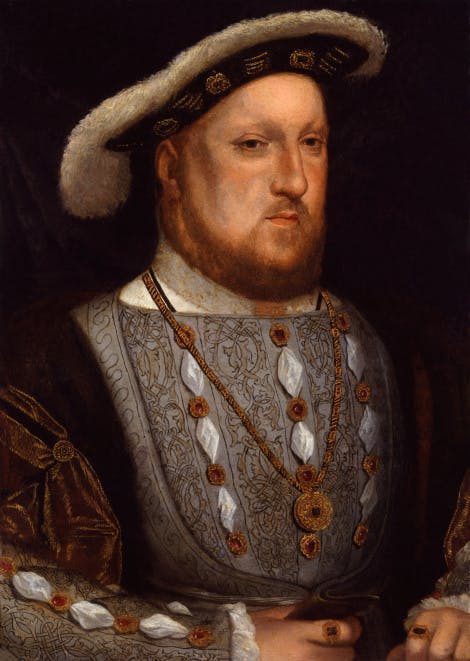
Henry VIII, Terrible Tudor?
Who was the real Henry VIII?
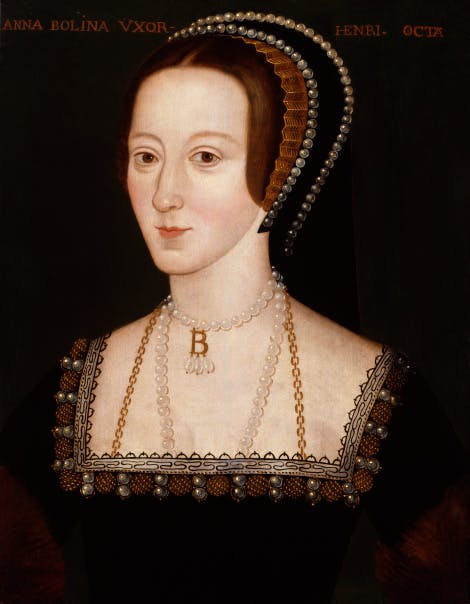
Anne Boleyn
How did Anne Boleyn become queen and why did Henry VIII execute her?
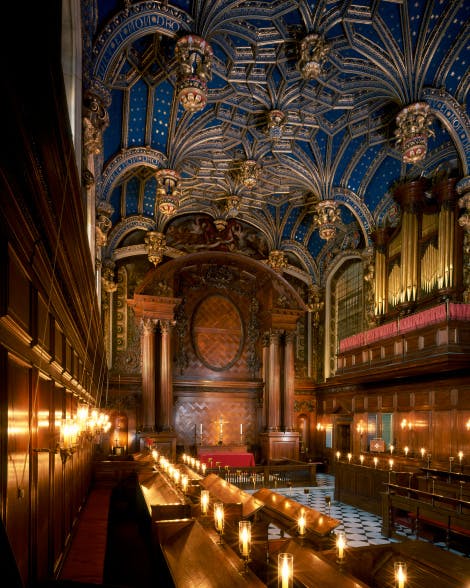
The story of Hampton Court Palace
Home of Henry VIII and the Tudor dynasty
Shop online

Shop Hampton Court Palace
Explore our gifts and souvenirs, inspired by over 500 years of history from Hampton Court Palace.
From £2.50

Shop Medieval
Step back in time with our medieval inspiration collection, full of fascinating ornaments and homewares for your collection.
From £3.50
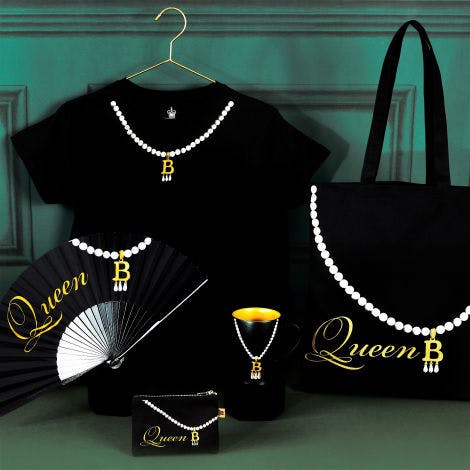
Shop Anne Boleyn
Shop our collection of gifts and souvenirs, inspired by the Anne Boleyn and her infamous 'B' pendant necklace.
From £3.00
